- Uber's efficiency surge boosts stock prices, but long-term sustainability questioned.
- Positive outlook for Uber's future earnings, projecting significant EPS growth by 2024.
- Focus on self-driving vehicles and AI investments as potential game-changers for Uber's profitability.
Few companies on Wall Street have been able to grasp this year’s moat better than the ride-hailing giant Uber Technologies (NYSE:UBER).
On the one side, the San Francisco-based company has greatly benefited from the resurgence of high-flying tech stocks as investors anticipate more dovish financial conditions in the near turn, favoring companies that are yet to turn a full-year profit.
On the other hand — and perhaps most importantly — Uber has been absolutely killing it in what Zuckerberg named the ‘year of efficiency.’
Not only has the company posted its two best earnings reports since going public, beating analysts’ earnings per share estimates by a lofty 1.570% in Q4 2022 and 100% in Q1 2023, but it also did so by cutting expenses, growing revenues, and improving EBITDA margins at a time when labor costs rose sharply and the threat of regulation for drivers around the world weighed on legal spending.
After a difficult pandemic — which led the company to postpone its plans for a fully profitable year — this year’s combination of factors has propelled the ride-hailing giant to its 52-week high with a nearly 100% rise in prices. Long term, however, the company still sits nearly 25% below its ATH of $64.05.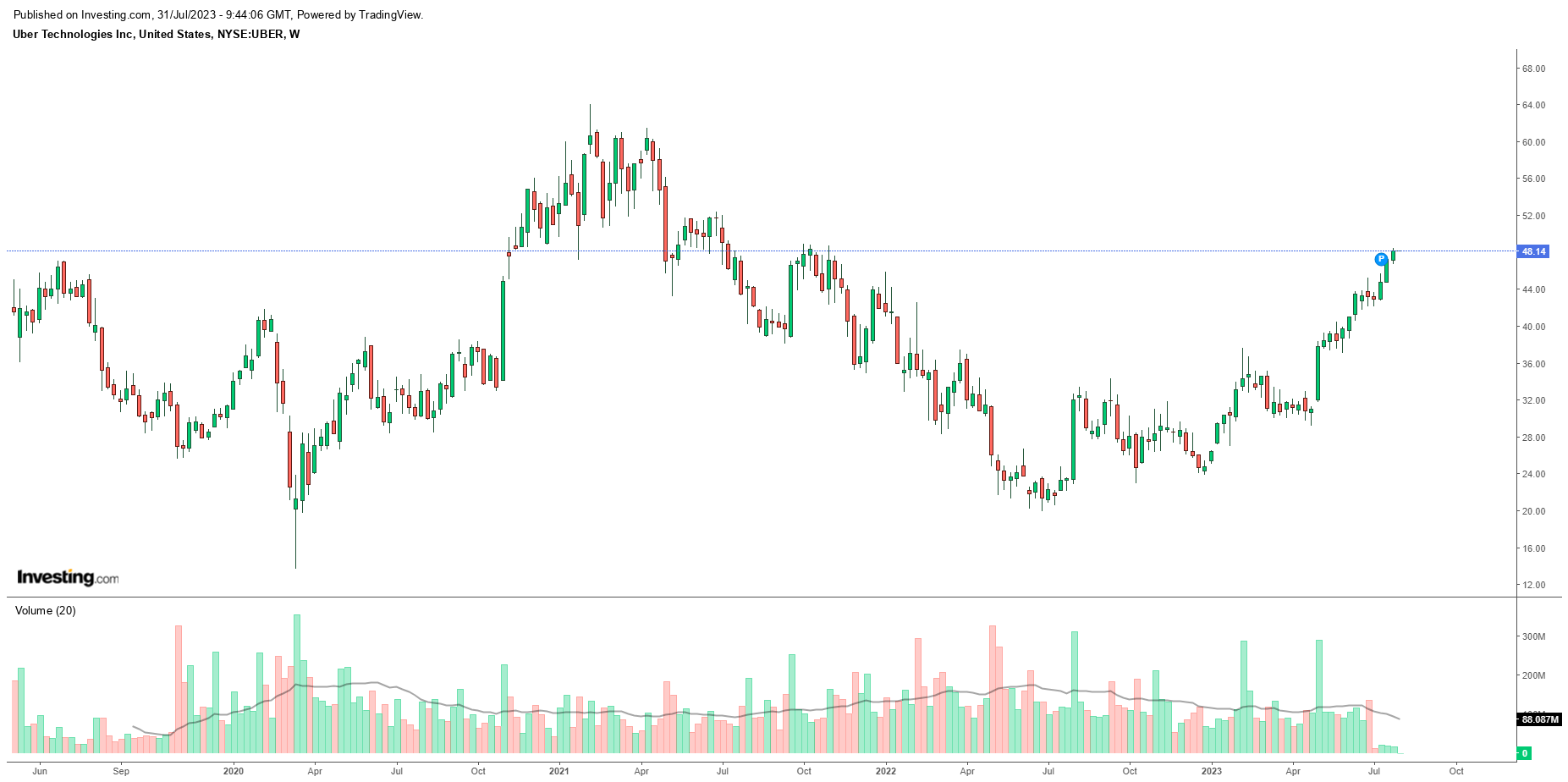
InvestingPro’s fair value estimate indicates that Uber still has a 5.1% upside potential in the next 12 months with medium uncertainty. 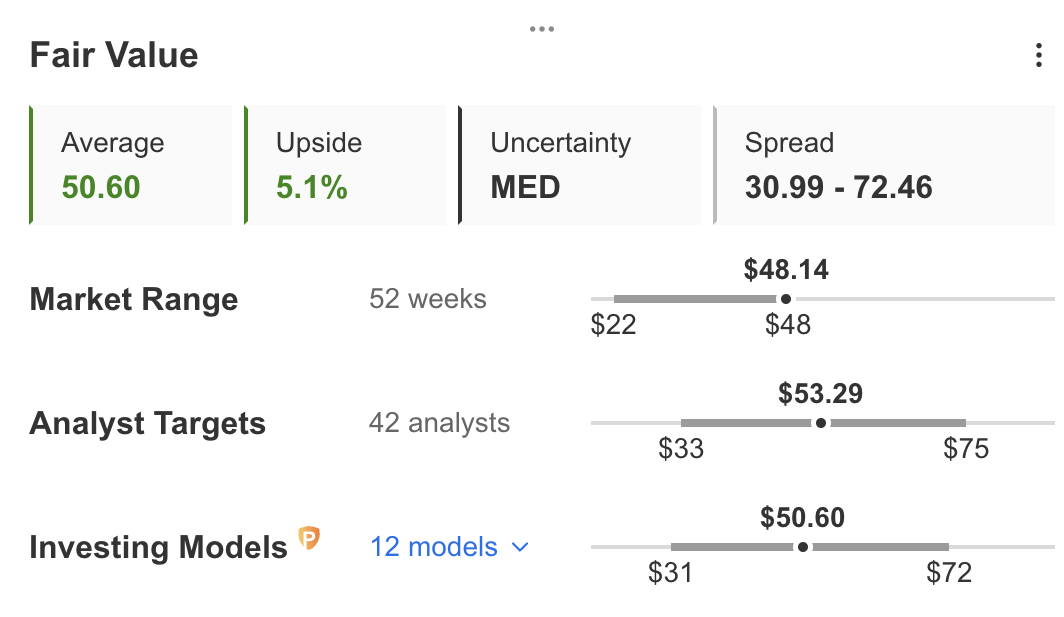
Source: InvestingPro
On the macro side, the market has broadened its YTD rally toward more sectors, suggesting a broader correction may be nearing from seemingly overbought stocks. 
With valuation looking stretched from a short-term perspective but with earnings trending higher, the bull vs. bear discussion for Uber stock grows increasingly disputed.
Let’s take a deeper dive into the company’s fundamentals to understand where we stand right now.
Profitability Growth and Margins
After the company’s IPO in 2019, Uber hasn’t yet managed to turn a full year of profitability and, hence, still holds a negative PE ratio of -28.9%. However, since turning the tables in Q4 2022 with a massive earnings beat, Uber’s unprofitable days have been counted. 
Source: InvestingPro
Wall Street has high expectations for Uber’s future earnings, with EPS projected to reach $1.09 per share this year, $1.70 in 2024, and $2.34 in 2025. This would imply an impressive increase of 37%, 56.4%, and 132.8%, respectively, bringing PE to as low as 20x in 2025. 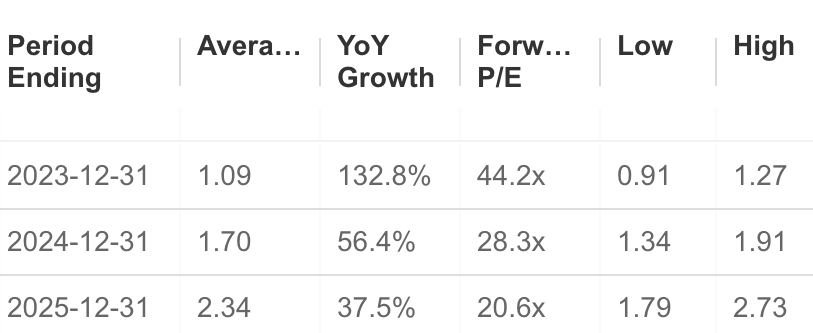
Source: InvestingPro
Revenues are also trending much higher and are expected to reach compelling levels in 2024. According to projections, Uber’s revenue is expected to increase by 18% in 2023 and a further 19% in 2024, reaching $44.51 billion compared to $31.88 billion in the full year of 2022. 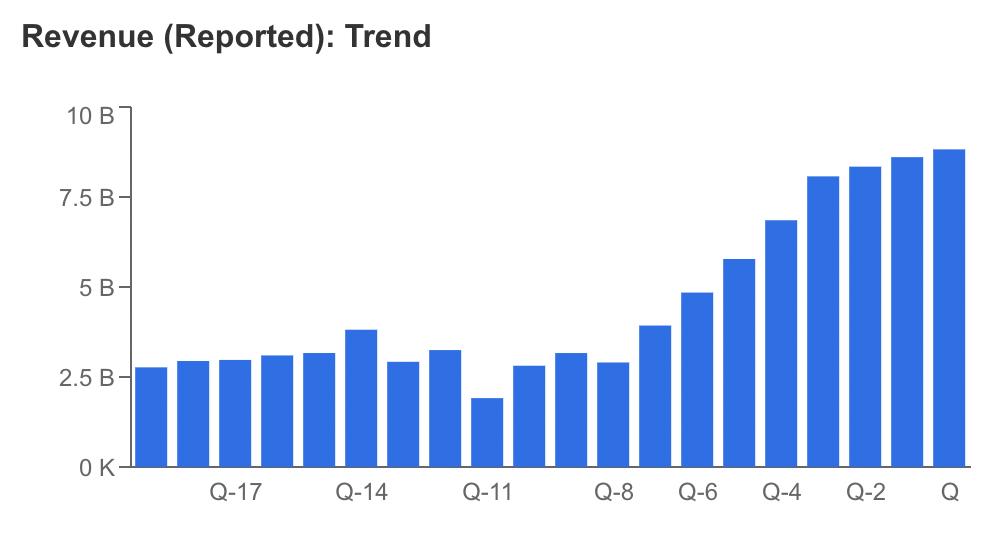
Source: InvestingPro
More impressively, those numbers come on the back of improving gross margins in spite of the difficult macro environment, especially for companies that depend on highly-skilled labor. 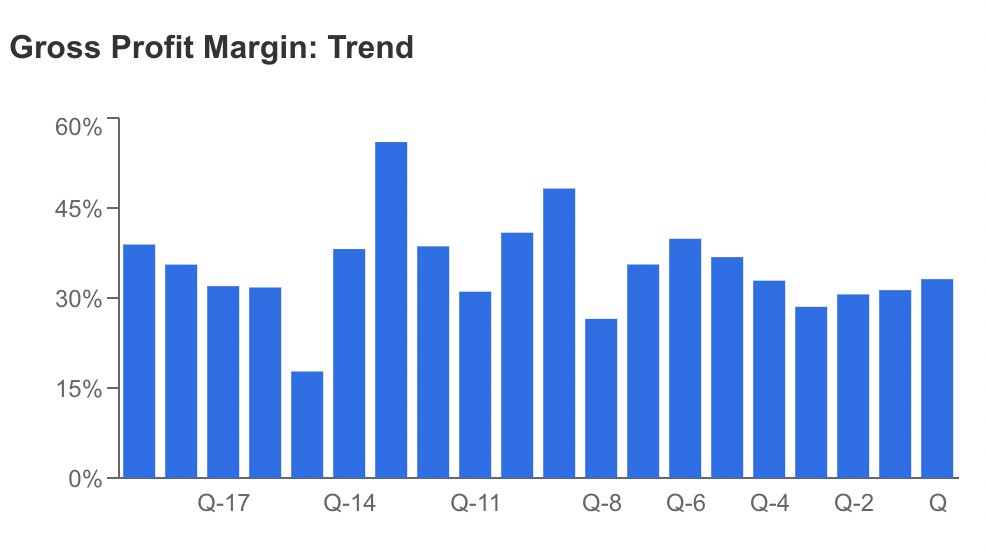
Source: InvestingPro
Uber has also reported lower operating expenses, indicating the company has managed to stay financially resilient as it works patiently toward a highly profitable 2024. 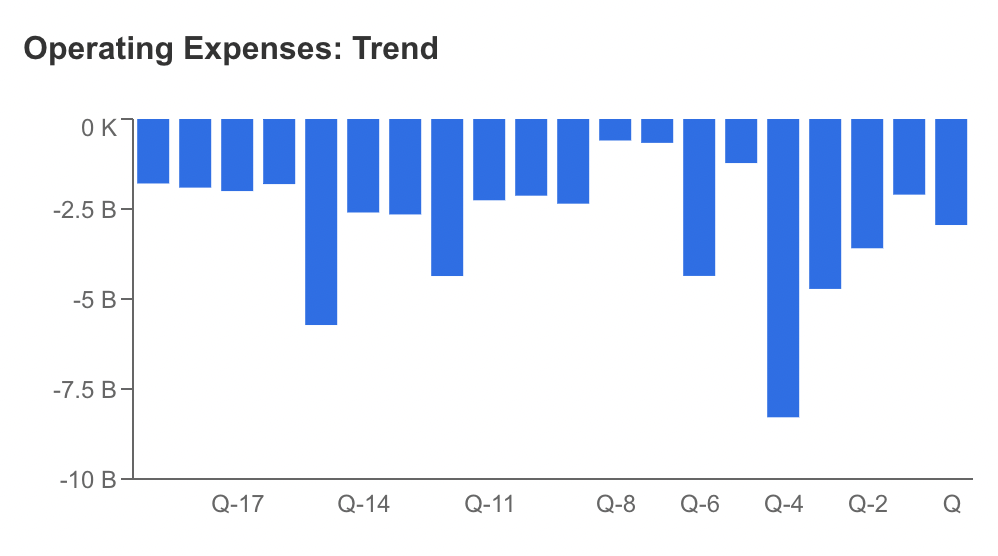
Source: InvestingPro
But the main metric investors should pay attention to in tomorrow’s earnings is Uber’s EBITDA margins. After turning a positive reading for the first time in Q4 2022, the company has been fighting to maintain a neutral reading. 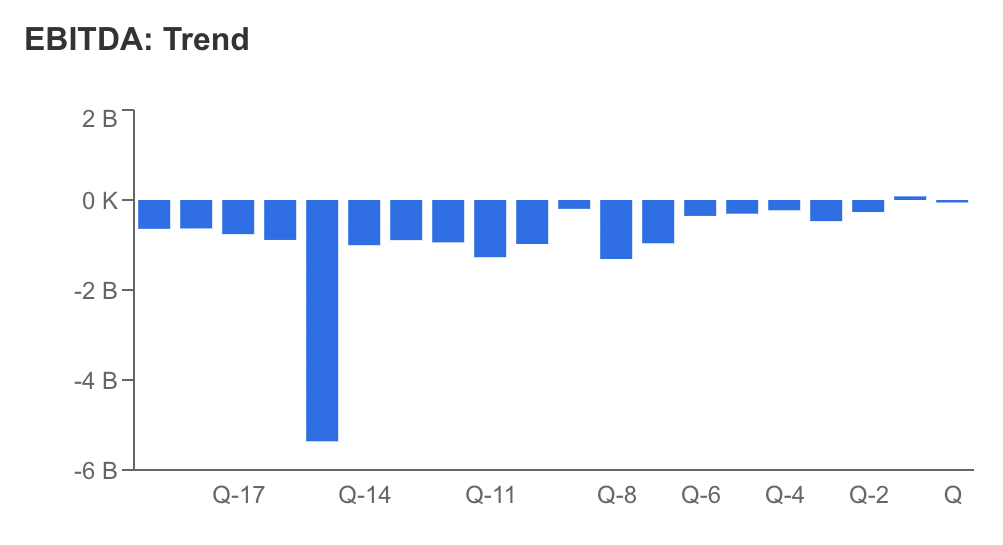
Source: InvestingPro
A neutral to positive reading tomorrow would imply Uber has been doing a much better job than the competition in terms of securing funds for future investments, which should be key in 2024 onward as a combination of AI and EV developments is expected to overtake the sector.
Self-Driving Vehicles, AI
Uber envisions a future in which fleets of autonomous vehicles seamlessly navigate through bustling cities, revolutionizing urban transportation, food delivery, and logistics services.
Recently, in late May, the company made a noteworthy stride towards realizing this vision by unveiling a groundbreaking multi-year strategic partnership with Waymo, a renowned leader in autonomous driving technology.
CEO Dara Khosrowshahi said at the time he envisions that the integration of autonomous vehicles will create a self-reinforcing cycle. According to his vision, as more autonomous cars are deployed on the roads, there will be an increase in transportation options, which, in turn, will drive down prices gradually. This affordability should stimulate a surge in demand for these services, thus fueling further expansion and adoption of autonomous vehicles in the market.
″We are absolutely committed to self-driving cars,” Khosrowshahi told NBC at the time.
Business-wise, if Uber manages to fully deploy such a strategy in the next few years, margins would trend much lower, improving revenues and, thus, making the stock price very cheap from a fundamental perspective.
Again, to wit, Uber’s main profitability drag remains its high cost of revenues due to the percentages paid to its drivers amid an inflationary environment.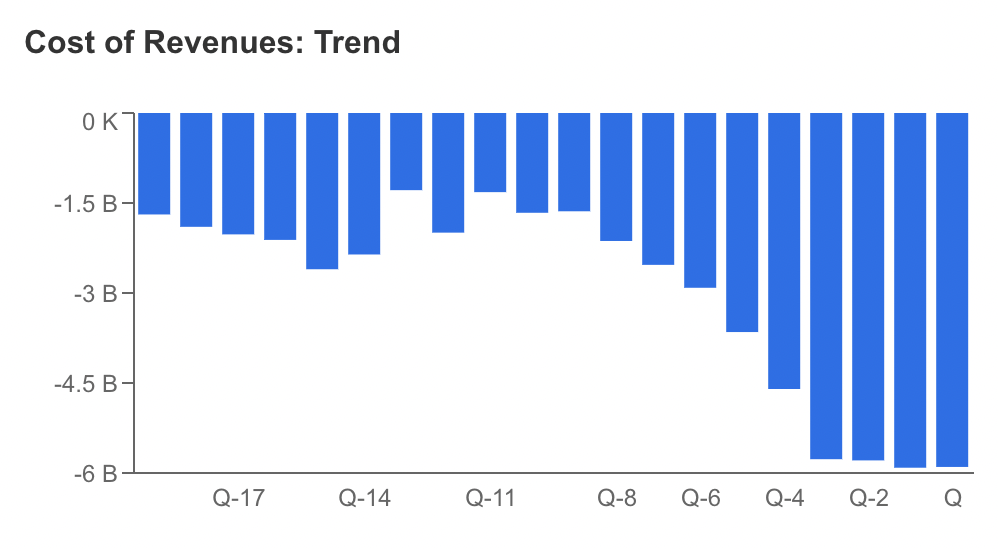
Source: InvestingPro
To make CEO Khosrowshahi's vision work, Uber has been investing hard in AI and the improvement of its data centers.
Uber already incorporates AI in various aspects of its operations, such as route planning, demand forecasting, and customer communication. However, the next step - integrating AI and self-driving - is a major step leap that will depend on healthy margins from the giant. Moreover, the legal implications of such an endeavor could very well weigh on the company’s financials throughout the process.
Another legal issue is the constant breach of user data in Uber apps, which has been consuming large sums of investment from the company. As CEO Khosrowshahi pledges to keep investing in the field, it is possible that Uber’s operating costs will remain elevated going forward.
Bottom Line
Margins, margins, margins.
Uber's future prospects hold an interesting promise from both macro and micro perspectives. However, the attractiveness of investment will hinge upon the company's ability to secure substantial funding amid high operating expenses.
As the race for self-driving vehicles and the widespread implementation of AI in everyday life intensifies, only the most efficient companies will be able to thrive. Notably, Uber has demonstrated an edge over its rivals and is expected to maintain this competitive advantage in the next few years.
For investors seeking long-term gains, Uber's stock appears promising. Nevertheless, caution is warranted as current levels may indicate an overbought situation, and a broader market pullback could present a compelling opportunity for those seeking an advantageous entry point.
***
Hurry up and enjoy the final day of our InvestingPro summer sale!
Disclosure: The author doesn’t own Uber stock.

